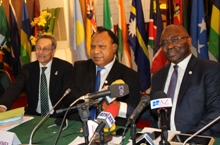ACP Council ends with bolstered commitment to leaders’ Summit, firm stance on trade
 Dakar, Senegal, 28th April 2016/ ACP: African, Caribbean and Pacific Ministers concluded their 103rd session at the King Fahd Palace in Dakar, Senegal yesterday with a renewed determination to ensure the success of the upcoming Summit of Heads of State and Government in Papua New Guinea, as well as an appeal to the European Union for flexibility on free trade deals with the ACP regions.
Dakar, Senegal, 28th April 2016/ ACP: African, Caribbean and Pacific Ministers concluded their 103rd session at the King Fahd Palace in Dakar, Senegal yesterday with a renewed determination to ensure the success of the upcoming Summit of Heads of State and Government in Papua New Guinea, as well as an appeal to the European Union for flexibility on free trade deals with the ACP regions.
(CLICK TO DOWNLOAD: Decisions & Resolutions – 103rd session of the ACP Council of Ministers)
Amongst several key decisions and resolutions taken, the ACP Council of Ministers welcomed the report by the Eminent Persons Group, chaired by former President of Nigeria Chief Olusegun Obasanjo, entitled “A New Vision for our Future – A 21st century African, Caribbean and Pacific Group delivering for its Peoples.”
The report, resulting from more than two years of research, consultations and reflection, includes recommendations to reform the organisation and reposition it as a more effective international force on the global scene. It will be tabled at the 8th ACP Summit of Heads of State and Government, scheduled for the 30th May – 1st June 2016 in Port Moresby, Papua New Guinea.
The Summit is expected to be a watershed event for the ACP Group of States, in terms of providing the necessary political mandate to reorient the organisation, and a basis for more concrete engagement in discussions on the future of ACP-EU relations after 2020. The Minister of Foreign Affairs of Papua New Guinea Hon. Rimbink Pato made a presentation to Council on the state of preparations for the 8th Summit and urged delegations to ensure high levels of participation.
Zika Virus
The ACP Council of Ministers took a decision for an urgent response to the outbreak of the Zika virus in Caribbean countries. The Zika virus has been declared a public health emergency of international concern by the World Health Organisation (WHO). Noting its potential economic and social impact, the Council gave instructions for an appropriate financial allocation to be urgently made from the Intra-ACP resources of the 11th European Development Fund to address the situation.
Trade for development
The ACP Council of Ministers agreed on a resolution on the Economic Partnership Agreements (EPAS) between the ACP regions and the European Union. The Caribbean is the only region to have ratified a full regional agreement, which is currently being implemented. Three others – West Africa, East African Community, and the Southern Africa Development Community (SADC) EPA group – have signed.
The Council repeated previous appeals for flexibility from the EU so that outstanding negotiations can be concluded for mutual benefit, and called for the EU to resume the stalled negotiations with the regions of Central Africa, Eastern and Southern Africa (ESA) and the Pacific, at the ministerial level. The need for predictable, additional and adequate financial resources and technical assistance to support the implementation phase of EPAs was highlighted.
In other trade matters, the Council encouraged Member States to participate at the upcoming UNCTAD XIV, or the 14th United Nations Conference on Trade and Development on 17-22 July 2016 in Nairobi, Kenya. Ministers committed to establish a stronger working relationship with UNCTAD, with the aim of harnessing trade as an engine for sustainable and inclusive development.
Fisheries & Sugar
The ACP Council of Ministers made a resolution on fisheries, directing the ACP Secretariat to take steps to support Member States in negotiating improved bilateral Sustainable Fisheries Partnership Agreements with the European Union. Issues regarding fisheries subsidies and Special Differential Treatment are to be pursued in the post-Nairobi work programme of the World Trade Organisation (WTO). The Council urged that the ACP Secretariat continue to work with regional fisheries organisations or mechanisms, and to consider fisheries as a climate-sensitive area when programming the Intra-ACP funds of the 11th EDF.
In a separate resolution, the Council welcomed several developments in talks on sugar with the European Union, including assurances that the EU Safeguard Mechanism will not be applied automatically, and that the EU will not impose any mandatory County of Origin Labelling (COOL) for sugar. Ministers further insisted that no intervention is made to increase the supply of sugar within the EU which could undermine the fragile recovery in sugar prices in some ACP Member States.
Other matters
In addition to these issues, the Council of Ministers took decisions on internal institutional matters related to staffing and budget. Territorial tensions between Belize and Guatemala, as well as between Guyana and Venezuela were discussed, with Ministers confirming their support for the territorial integrity of ACP Member States in these disputes.
DOWNLOAD: Decisions & Resolutions texts in PDF.
(Photo: Post-meeting press conference with ACP Secretary General Dr. Patrick Gomes, Minister of Foreign Affairs of Papua New Guinea Hon. Rimbink Pato, and the President of the 41st session of the ACP Council of Ministers, the Minister of Planning and Integration of the Republic of Congo H.E. Leon Raphael Mokoko.)
For more information, please contact:
Josephine Latu-Sanft
ACP Press Office
Brussels +32 2 7430617
Dakar +221 785222976
latu@acp.int
